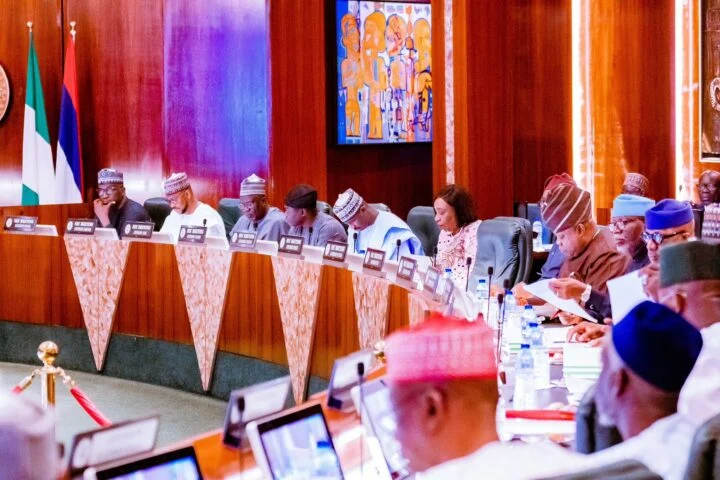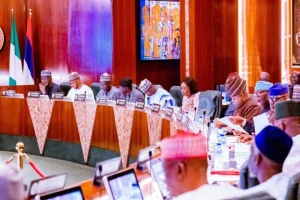
NEC APPROVES NEW TEXTILE BOARD, $90BN AGRIBUSINESS & LIVESTOCK PLAN

The National Economic Council on Thursday approved the establishment of a Cotton, Textile and Garment Development Board to propose new strategies for agribusiness expansion and livestock transformation, which are expected to generate up to $90bn in economic value by 2035.
The plan is intended to “reposition Nigeria’s economy and tackle insecurity at its roots,” according to a statement signed by the Senior Special Assistant on Media and Communication to the Vice President, Stanley Nkwocha.
The resolution followed the 149th NEC meeting at the Presidential Villa, Abuja. NEC is chaired by Vice President Kashim Shettima, with the Governors of the 36 states of the federation, the Governor of the Central Bank of Nigeria, the Minister of Finance, and other co-opted government officials as members.
The meeting began with a minute of silence in honour of the victims of recent killings in Benue and Plateau States, and expressed condolences to the people and governments of the affected states.
Other initiatives approved by the council included the establishment of the Green Imperative Project national office in Abuja and regional offices across the six geopolitical zones. It also addressed the crises caused by the country’s current system of animal husbandry.
“As Nigeria’s regulatory body for the cotton, textile and garment sector, the Board will include governors representing the six geopolitical zones, with members representing the Ministers of Agriculture and Food Security, Budget and Economic Planning, and Industry, Trade and Investment,” Nkwocha said.
Once established, the board will be domiciled in the Presidency, private sector-driven, with representation from relevant public sector stakeholders, and funded from the Textile Import Levy collected by the Nigeria Customs Service.
NEC also approved the establishment of the Green Imperative Project’s national and regional offices, and gave backing to the formal launch of the National Agribusiness Policy Mechanism.
Addressing issues of empowerment and food security, Vice President Shettima urged council members to be bold in decision-making, stating they must “resist the temptation of grand rhetoric and embrace the hard work of reform.”
“The nation is watching. Our citizens are not waiting for another speech. They are waiting for results. This Council must remain a meeting point of ideas that move the nation forward. Let us rise above partisan interests and regional divisions and focus on what truly matters—building a nation that delivers for all,” he said.
Shettima reminded members that their presence at the meeting was not ceremonial but rooted in “the resolve to confront the pressing realities that define the lives of the Nigerian people,” urging proactive governance instead of reactive responses.
He said: “Governance, in truth, is not the theatre of promises. It is the solemn business of fulfilment. Today, as always, we are not here to admire the beauty of policy design but to ensure the substance of its execution.
“The task before us is monumental, but it is not unfamiliar. At our last meeting, we launched bold initiatives and reawakened our sense of duty to the nation. Today, we return with even greater clarity about what lies ahead. We must always bear in mind that we are not merely responders to crises. We are architects of a sustainable future.”
The Vice President stated that the establishment of the Cotton, Textile and Garment Development Board aligns with President Bola Tinubu’s economic revival agenda.
He said the initiative “is a call to resuscitate a sector that once clothed the people and powered the nation’s economy.
“Nigeria is a nation where cotton can thrive in 34 states. Yet our production level remains a fraction of our potential.
“We currently produce only 13,000 metric tonnes, while we continue to import textiles worth hundreds of millions of dollars. This is not just an economic imbalance. It is an invitation to act.”
According to him, the board will be funded by the textile import levy and have a presence in all geopolitical zones.
“Our goal is not just regulation. It is a revival. This is our opportunity to re-industrialise, to empower communities, and to restore pride in local production,” Shettima explained.
On strengthening the nation’s food security, Shettima said that, while it aligns with the Nutrition 774 Initiative, the broader goal is to build an inclusive, efficient and sustainable national food economy.
“NEC’s deliberations must inspire action, deepen unity and uplift the lives of citizens,” he added.
To ensure impact, he proposed that the NEC Implementation Monitoring Committee conduct field visits to bridge the gap between policy and performance.
Meanwhile, the Accountant-General of the Federation, Mr Shamseldeen Ogunjimi, briefed the Council on the federation accounts.
He reported that, as of April 2025, the Excess Crude Account stood at $473,754.57, the Stabilisation Account at ₦63.54bn, and the Natural Resources Development Account at ₦72.86bn.
The Minister of Education, Dr Tunji Alausa, also briefed NEC on skills development, announcing plans to equip five million youths with income-generating and industry-relevant skills by 2030.
He stated that the National Council on Skills, chaired by the Vice President, had resolved to strengthen the Technical and Vocational Education Training (TVET) system to deliver quality education through a standardised, accredited and modernised framework.
The initiative will integrate partnerships with MDAs, sub-national governments and the private sector.
NEC commended the Federal Government’s commitment to embedding skills development into education policy and budgets and urged state governors to leverage the opportunities for youth empowerment, regardless of political affiliation.
The Council also received a presentation from the new Ministry of Livestock Development on the Nigeria Livestock Growth Acceleration Strategy.
This strategy builds on the 2018–2028 National Livestock Transformation Plan and aims to modernise the sector, focusing on cattle ranching and peacebuilding.
It projects a livestock sector worth $74bn–$90bn by 2035, in collaboration with states, private investors and under a sound regulatory framework.
Between 2025 and 2026, investment will prioritise animal health, feed and water management, data systems and breed improvement as part of a comprehensive livestock value chain development.
The Council endorsed proposals to support this transformation, including recognising the FMLD’s inheritance of NLTP, transferring ₦100bn in approved resources, creating state ministries, and collaborating with the federal ministry for technical support and disease control.
Further proposals included exporting red meat to the Middle East and Asia, attracting private investors, and partnering with state investment companies to create jobs and revenue.
NEC concluded by endorsing the ministry’s recommendations, stressing the need to modernise livestock production and urging active sub-national and private sector participation.
